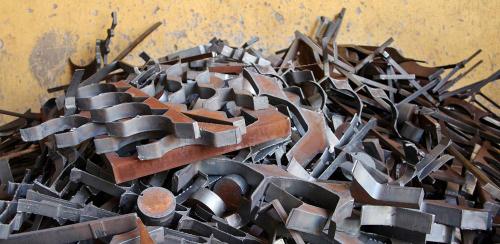Steel Recycling
Steel is one of the many metals that can be recycled numerous times without the process affecting its chemical properties. Close to 70 percent of the steel used in the US is recycled each year, and that number will continue to grow as production facilities continue to refine their processes.
Steel is used in a variety of industries and can have many different applications. Regardless of the application, end users and producers alike are always looking for ways to cut costs. One way of cutting costs in the steel industry is through the utilization of the steel recycling process.
What Is Steel Scrap and Why Does It Matter?
The remnants of steel that are recycled are referred to as scrap and they can be broken into three main categories.
- Home scrap refers to either rejected pieces or trimmings produced by steel mills during the production process. Home scrap is reused by the mills to produce additional material.
- Prompt steel classifies any steel that has been used for further processing and manufacturing purposes. Organizations who produce prompt scrap often sell the excess material to scrap buyers for a premium price, which in turn can reduce their operating costs.
- Obsolete scrap covers all other types of steel waste like automobiles and appliances. Regardless of the type of scrap, all recycled steel will eventually find its way back to a steel mill to be repurposed.
Once the recycled steel has returned to the mill, it is melted down using temperatures around 3,000 degrees. During the reheating process, the recycled steel is purified, and the production facility can rid it of any contaminants. This process is how steel mills ensure the chemical integrity of the recycled steel. Once the steel is melted down and purified, it is then formed back into workable material and sold across various industries.
Unlike many materials, steel can be recycled repeatedly without degrading its structural properties. This makes scrap steel a reliable, high-value input for mills using electric arc furnaces (EAFs) and an important supplement for integrated mills as well.
The Environmental Benefits of Steel Recycling
The steel recycling industry has many benefits including reducing the amount of energy required in the production process, reducing costs for production facilities and end users, and reducing the number of natural resources originally required to produce steel such as coke and ore. Steel recycling processes continue to improve, which will continue to make steel one of the most sustainable raw materials on the market!
Steel is the most recycled material in North America, and for good reason. Using scrap steel significantly reduces the environmental footprint of steel production:
-
Lower energy consumption compared to producing steel from iron ore
-
Reduced greenhouse gas emissions, supporting decarbonization goals
-
Conservation of natural resources, including iron ore and coal
-
Less landfill waste, keeping valuable material in circulation
For Pennsylvania steel producers operating under increasingly strict environmental standards, scrap recycling is a practical path toward lower-carbon steel production.
Steel Recycling and Scrap: Powering Sustainable Steel Production in Pennsylvania
Steel recycling and scrap utilization are foundational to modern steelmaking—and in Pennsylvania, they play an especially critical role. As a historic hub of U.S. steel production, the Commonwealth continues to lead in responsible material sourcing, efficient manufacturing, and sustainable supply chains. For steel mills and manufacturers alike, recycled steel scrap is not just an environmental choice—it's a strategic one.
Pennsylvania's Role in the Scrap Steel Supply Chain
Pennsylvania's industrial base, transportation infrastructure, and proximity to major manufacturing markets make it a key player in the steel scrap ecosystem. Scrap processors, recyclers, and steel mills across the state form an interconnected network that supports:
-
Reliable domestic steel supply
-
Shorter transportation distances and lower logistics costs
-
Faster turnaround times for recycled material
-
Greater resilience against global raw material volatility
For steel mill suppliers in PA, sourcing and processing high-quality scrap locally helps ensure consistent chemistry, cleaner melts, and dependable production schedules.
Quality and Consistency in Scrap Steel
While scrap steel offers many advantages, quality control is essential. Proper sorting, grading, and testing help mills achieve the mechanical properties and specifications required for demanding applications such as construction, energy, and manufacturing.
Trusted steel suppliers work closely with recyclers and mills to ensure:
-
Consistent scrap grades
-
Minimal residuals and contaminants
-
Compliance with ASTM and industry standards
This collaboration supports both performance and sustainability goals.
The Future of Steel Recycling
As demand grows for low-carbon and responsibly sourced steel, recycling and scrap utilization will only become more important. Advancements in scrap sorting technology, melt efficiency, and data tracking are further improving the value of recycled steel in the supply chain.
For Pennsylvania steel mill suppliers, investing in scrap-based solutions aligns with customer expectations, regulatory trends, and long-term industry competitiveness.
Steel recycling isn't just a sustainability initiative—it's a cornerstone of efficient, modern steel production. By leveraging high-quality scrap and maintaining strong regional supply chains, Pennsylvania's steel industry continues to support economic growth while reducing environmental impact.
As a steel mill supplier rooted in PA, supporting responsible scrap sourcing and recycling is part of building a stronger, more sustainable steel future.

